"There's a gannet!" shouts David Boyd over the roar of the boat engine, as a sleek white bird plunges out of the sky and nosedives into the blue-black Atlantic Ocean. It resembles a huge seagull with grey-tipped wings, and can barely take off from the glut of fish in its belly. "The first gannet ever I saw in Tizzard's Harbour in 70 years," Boyd says with wonder, turning coyly to his wide-eyed boat passengers. "Now, that's what you call an unscripted moment."
The weather has turned cold here, on the northeastern coast of Newfoundland, about 400 kilometres north of St. John's. The wind whips black waves into white peaks that echo the ragged, primordial geology, while high, puffy clouds rush through a vivid blue sky. It's nearly winter, but tourists are still arriving in droves; when weather allows, Boyd's boat is booked solid.
Have you signed up for the Globe Style Newsletter yet? Every Thursday morning, find original features on the players and trends influencing fashion, design and entertaining plus product news, shopping tips and inspiration for living well – right in your inbox. You can sign up now!
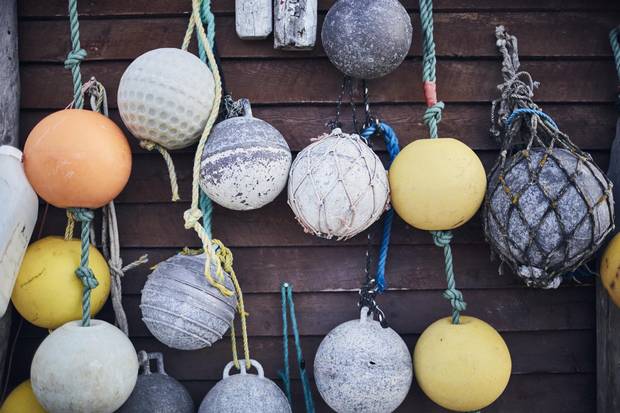
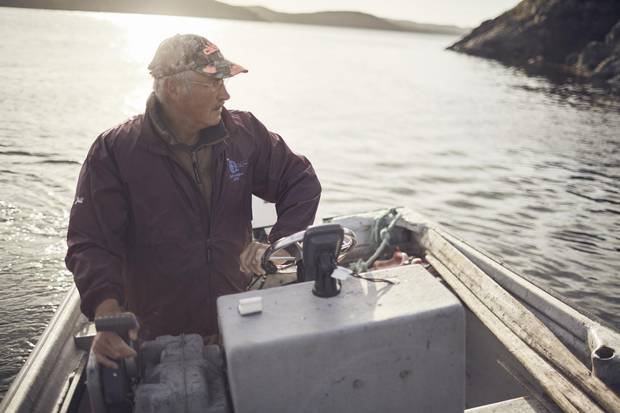
Close to Fogo Island, Tizzard’s Harbour on neighbouring New World Island is where Dave Boyd hosts visitors for boat tours of the Atlantic. Canada’s far East Coast is full of quiet spots to reignite your creative spark.
Boyd might be a fourth-generation fisherman but isn't certain, because no one recorded the year his family first arrived on New World Island. He bought his first lobster licence for 25 cents when he was seven years old. These days, he goes after lobster in the summer, cod when the government allows and tourists the rest of the time. Located minutes from the town of Twillingate, "Captain Dave" and his wife Christine also run Prime Berth Twillingate Fishery & Heritage Centre. His first poem, I'm a Fisherman, hangs on the wall of the museum. Admission is $5.
A half-hour boat ride away, bobbing offshore from his birthplace (population: 45), Boyd recites the beginning of the poem by heart: "My motor pounds me into another day/As I come from the harbour and into the bay/Where my nets are set," he says. "I've sold five thousand copies of my book of poetry just in my own store. That makes me a bestselling author."
Boyd is just one of many enterprising folks on this serrated coast, a region largely written off after the collapse of the cod fishery by all but its most committed residents. Today, there is a growing entrepreneurial drive in the region, a resourcefulness born of the isolation that makes the area so appealing to visitors wishing to disconnect. It's satisfyingly ironic: our busy, overwhelmed society is constantly chasing innovation in bustling urban centres or the equally frenetic online world, but the most combustible creative fuel might actually be found where scarcity meets inventiveness. If that's the case, outport Newfoundland is an ideal place to spark a brilliant idea.
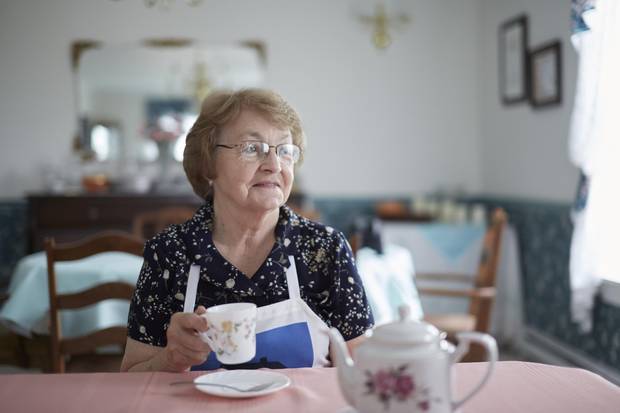
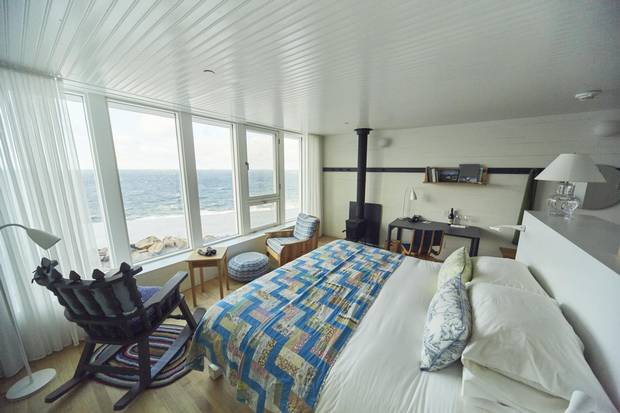
Zita Cobb, owner of the Fogo Island Inn, calls Beulah Oake a pioneer in attracting tourism to outport Newfoundland. Cobb herself lured designers and artists from around the globe to her hotel to work with locals on the inn’s decor, pictured here.
The people of this striking, hard, complicated destination , whose families have scraped a living off the land and ocean for generations, are accustomed to making the most of what nature and fate deliver. "The minister of tourism once said if I had as much money as guts I'd be dangerous," says 79-year-old Beulah Oake, the operator of Seven Oakes Inn & Cottages on Change Islands. The main attractions here are hiking trails, a Newfoundland pony sanctuary, a museum and her inn, which opened in 1985.
"I used to see people sitting on the rocks, out by the church, eating a packet of chips and drinking a bottle of pop, and I thought, someday there would be a place where someone could come in and have a lunch," she says, rocking in her plush armchair. "Everyone on this island, including my father-in-law, thought we were absolutely crazy."
Almost every week during the summer, Oake, who was widowed in 2006, still makes the four-hour round trip to Gander to buy fresh fruits and vegetables for her home-cooked meals. She buys cod from a local fisherman, and uses a clothesline to hang the enormous piles of linens used by her guests who visit from distant lands including Saudi Arabia, Japan, New Zealand and China. "I've never bought a loaf of bread since I've been here. We make our own desserts, beets, jams," she says. "I don't have to go past the clothesline on my deck. All the world comes to me."
She says these islands have long served as a muse for painters, writers and photographers, drawn by the scenery but also the remoteness. It's that awareness of distance and a sense of detachment from the modern world, that is both simultaneously the truth and stereotype of life here. "People say they feel so good when they get off the ferry," says Oake. "They feel free."
Oake is a pioneer in bringing visitors to the region, according to Zita Cobb, the retired tech CFO and multi-millionaire behind the luxury Fogo Island Inn. Designed by Gander-born architect Todd Saunders, it opened in 2012 on a neighbouring island, about a half-hour ferry ride away. Its core spirit, she says, is embracing the duality between the contemporary and the traditional, while being respectful of the past, aware of the future, and practical in the present.
When Cobb began working on her inn, she first needed a building, and then that building needed furniture and wallpaper and lights and pillows and so on. Because Cobb's deep pockets and idealism provided for it, a rigorous design process took place. For three weeks one February, long before the inn was built, a group of international designers and island artisans were brought together to design furniture and textiles for the project. "We spent so much time poking about in old houses, getting into attics, just trying to understand where we've come from," says Cobb.
One standout piece that evolved from that treasure hunt is the Bertha, a plush, sturdy birch chair inspired by local barrel-making traditions, covered in rock-grey and sky-blue lambswool cushions. It's a modern piece of furniture, but also a natural evolution from a hundred-year-old grey painted rocking chair on display at the Change Islands museum: a grandmother's knitting chair, made from a repurposed barrel. A local furniture builder vetted the spirit of each piece, and, as a result, she says there's, "a church full of furniture that never made it into the inn."
Newfoundland artist Michael Pittman participated in a week of those chilly wintertime sessions. His group spent six to eight hours a day in an old church, fires roaring, talking local vernacular and modern craft (the hotel now runs an ongoing artist-in-residence program that hosts a global cast of creatives in its sculptural studio structures). Striking the balance between paying homage to traditional creative pursuits and playing into a cliché of East Coast life can be tricky, particularly in Newfoundland. "If some people had their way, this would be Disneyland," Pittman says.
Pittman, who was listed for the Sobey Art Award in 2013, recently bought a summer home in Greenspond, a village about two hours south down the coast from Fogo. Born in Corner Brook on the island's western coast, his work deals with the relationship between personal narrative, psychology and folk belief. Demystifying his relationship with his homeland is something he often considers. "I've tried to develop a relationship with it that avoids romanticizing it, but it is always there," he says, sitting on a couch while his young son plays on the floor nearby. "I still try to come to it from that perspective in my work without letting things get syrupy. Which is easy. It really is."
According to Cobb, a fundamental question for locals working in the hospitality industry is how to create meaningful time between residents and visitors without fossilizing the former or exploiting either. One solution she came up with was the creation of a community host program, where local residents show tourists around the island. "There is a lot more to Newfoundland and Fogo Island culture than listening to someone play the accordion and getting screeched in," says Cobb. "We approach it like you have a third cousin coming to visit, who you've never met."
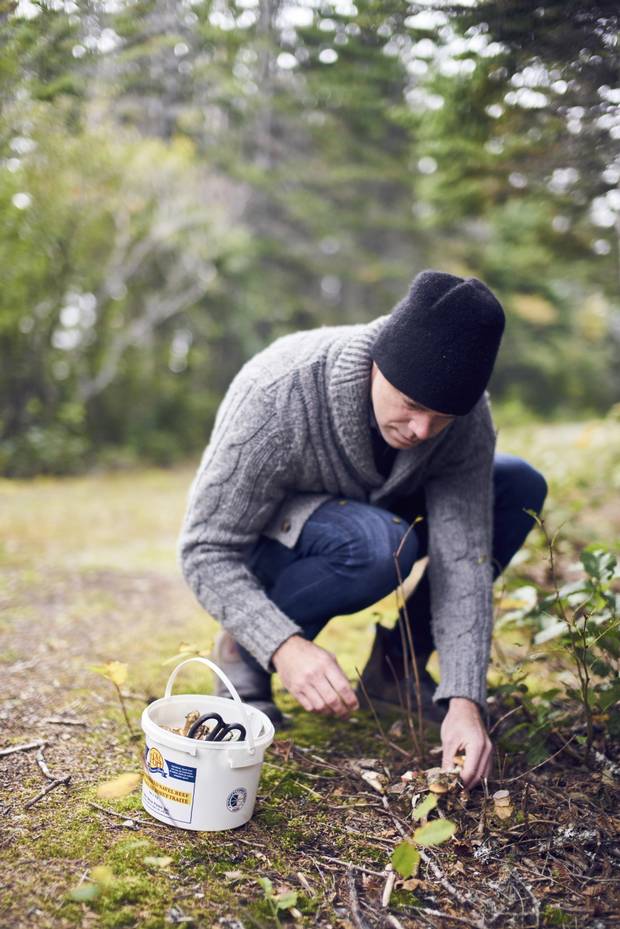
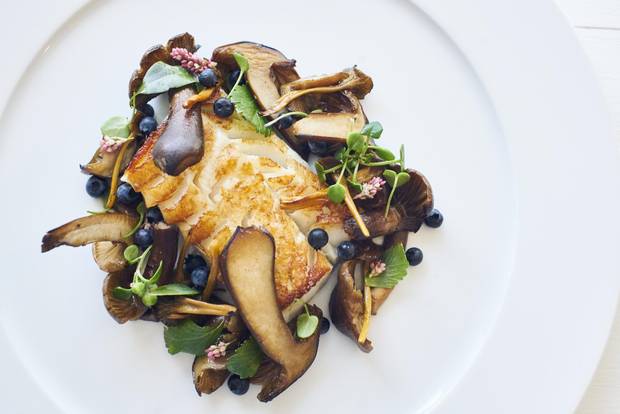
Fogo Island Inn chef Timothy Charles says the limits that come along with cooking somewhere so remote make his food more inventive.
Blanche Bennett has short, dark hair and thick-rimmed glasses; she was Fogo's town clerk for 20 years before she retired. Her father was a fisherman, and she grew up with seven siblings. "In the wintertime, we went to bed with so many quilts that you couldn't turn over," says Bennett. "We were poor people, and it made us what we are today: strong, resilient people. We appreciate things." After her husband died two years ago, the inn approached her to be a paid community host and she jumped at the chance.
Now, turning down a dead-end street, she shouts at Steve Ford, a 50-year-old fisherman standing on the steps of his house, to see if he has any salt cod. Holding the straps of his reflective orange overalls, he invites her into a shed, where a five-foot-high pile of cod is drying on racks in front of a wood-burning stove. Before the winter comes he'll drive his catch to Port aux Basques and sell it. With that money he'll buy two cut-up cows and bring them back to sell on the island.
"It's survival," says Bennett. "It's what you get used to," adds Ford. "I've been doing that now for the past 21 years. That's livelihood." Every week, while the cod fishery is on, he and his 73-year-old father will catch their combined quota of 5,000 pounds. "We're still fishing every day. Every day we can get out there. One of us, we're going to die out there, that's where we're going to drop down," he says, as Bennett shakes her head, clucking her tongue.

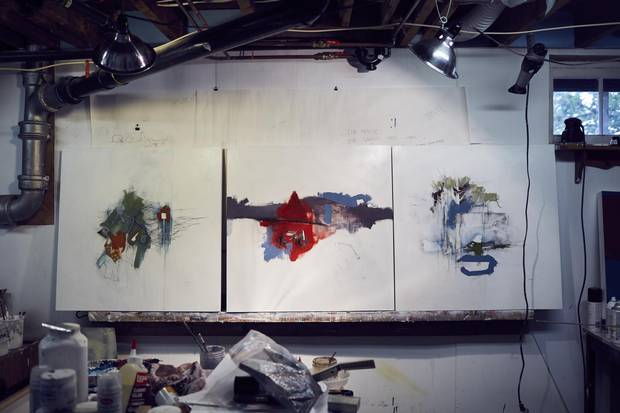
Artist Michael Pittman focuses, in part, on the unique creative energy of his homeland in his mixed media work.
Finding equilibrium between the past and the future can be especially tricky when it comes to cooking. It's easy to idealize heritage but harder to temper it to modern tastes. So, the challenge of pairing traditional ingredients and techniques with contemporary cuisine is something Fogo Island Inn cook Timothy Charles, a veteran of British Columbia's Wickaninnish Inn, takes very seriously. One example is his kitchen's use of salted and fermented greens, which speaks to an island custom of quartering cabbages, packing them in salt and eating them throughout the winter.
Scrambling between huge boulders in front of the inn, the freckled, broad-shouldered cook delicately picks wild celery, oyster leaf and scurvy grass with the tips of his fingers. "It's nice to have a limited palate in a way that really makes you pay closer attention," says Charles. "We could afford to fly product in from all over the place, and I'm not claiming we don't sometimes. But we're trying to capture this place."
Karen Pinchin travelled to Newfoundland as a guest of Newfoundland and Labrador Tourism, Adventure Central Newfoundland and the Fogo Island Inn. None of the companies reviewed or approved this article prior to publication.
Follow us on Instagram: @globestyle